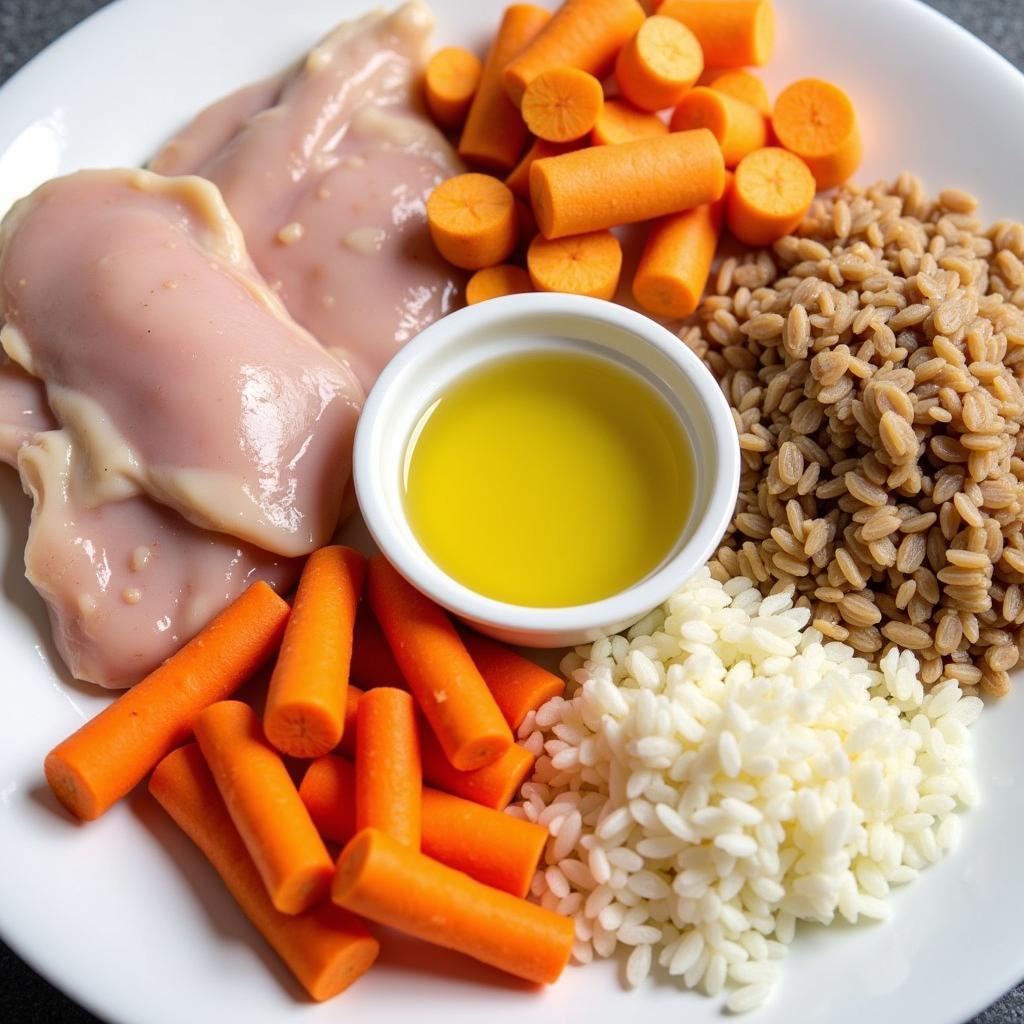Making Homemade Dog Food For Dogs With Liver Disease can seem daunting, but it’s a powerful way to manage their condition and improve their quality of life. By controlling the ingredients, you can ensure your furry friend receives a balanced, nutritious diet tailored to their specific needs. This article will guide you through creating delicious and healthy meals for your canine companion.
If your dog has been diagnosed with liver disease, you might be considering a change in their diet. dog not eating food but will eat treats can be a symptom of liver issues. Homemade food allows you to carefully select ingredients that support liver function and avoid those that may exacerbate the condition.
Understanding Liver Disease in Dogs
Liver disease encompasses a range of conditions that affect the liver’s ability to function properly. Common signs include jaundice, lethargy, vomiting, and decreased appetite. A veterinarian will diagnose the specific type of liver disease and recommend appropriate dietary changes. A low-protein, low-sodium diet is often prescribed for dogs with liver issues, as it reduces the workload on the liver.
Why Homemade Dog Food?
Commercially available dog foods, even those labeled for liver health, can contain hidden ingredients or additives that are harmful to a compromised liver. Homemade dog food offers complete control over ingredients, allowing you to prioritize easily digestible proteins, healthy fats, and essential vitamins and minerals. This approach can help to stabilize liver enzyme levels and improve overall well-being. For instance, you can completely eliminate excess sodium, a common concern in commercial dog foods, by preparing your pet’s food at home. You could also opt for salt free dog food if you’re not able to prepare homemade food.
Essential Nutrients for Dogs with Liver Disease
- High-Quality Protein: While protein restriction is sometimes necessary, it’s crucial to provide enough high-quality, easily digestible protein from sources like chicken breast, eggs, or cottage cheese.
- Healthy Fats: Essential fatty acids support cell function and reduce inflammation. Good sources include fish oil, flaxseed oil, and coconut oil.
- Complex Carbohydrates: Provide energy and fiber for healthy digestion. Opt for brown rice, sweet potatoes, and oatmeal.
- Reduced Sodium: Restricting sodium helps manage fluid retention, a common issue with liver disease.
Crafting the Perfect Recipe for Homemade Dog Food for Dogs with Liver Disease
A balanced homemade diet should include a protein source, a complex carbohydrate, and a source of healthy fats. Consult your veterinarian for specific recommendations based on your dog’s individual needs. Remember, even seemingly healthy foods like certain fruits and vegetables can be problematic for dogs with liver issues, so always seek professional advice before introducing new ingredients.
 Ingredients for Homemade Dog Food for Liver Disease
Ingredients for Homemade Dog Food for Liver Disease
Sample Recipe for Homemade Dog Food for Dogs with Liver Disease
This recipe provides a starting point and can be adjusted based on your vet’s recommendations.
- 1 cup cooked chicken breast, shredded
- ½ cup cooked brown rice
- ½ cup cooked sweet potato, mashed
- 1 tablespoon flaxseed oil
- 1 teaspoon fish oil
Combine all ingredients and mix well. Store leftovers in the refrigerator for up to 3 days.
Is Homemade Dog Food Difficult to Make?
Making homemade dog food doesn’t have to be complicated. With a little planning and preparation, you can provide your dog with a nutritious and delicious diet that supports their liver health. Many owners find that the benefits of controlling their dog’s diet far outweigh the effort involved. Also, understanding your dog’s dietary requirements can help explain why they might prefer treats over regular food, as discussed in our article on dog not eating food but will eat treats.
Monitoring Your Dog’s Progress
Once you transition your dog to a homemade diet, monitor their progress closely. Look for improvements in energy levels, appetite, and overall well-being. Regular check-ups with your veterinarian are crucial for assessing liver enzyme levels and making any necessary adjustments to the diet. You can also consider low protein and phosphorus foods for dogs as an option.
 Veterinarian Examining a Dog for Liver Health
Veterinarian Examining a Dog for Liver Health
Conclusion
Providing homemade dog food for dogs with liver disease can significantly improve their quality of life. By carefully selecting ingredients and working closely with your veterinarian, you can create a balanced and nutritious diet that supports liver function and helps your furry friend thrive. Consider white dog food for a visually appealing option as part of a balanced diet. Remember, always consult your veterinarian before making any significant changes to your dog’s diet.
FAQs
-
What are the signs of liver disease in dogs? Common signs include jaundice, lethargy, vomiting, and decreased appetite.
-
What kind of protein is best for dogs with liver disease? Easily digestible proteins like chicken breast, eggs, and cottage cheese are generally recommended.
-
Should I avoid all fats in my dog’s diet if they have liver disease? No, healthy fats are essential. Choose good sources like fish oil and flaxseed oil.
-
How often should I feed my dog homemade food? Consult your vet for specific recommendations, but most dogs are fed twice daily.
-
Can I give my dog treats if they have liver disease? Discuss treat options with your veterinarian, as some treats may contain ingredients that are harmful to the liver.
-
How do I transition my dog to a homemade diet? Gradually introduce the new food over several days, mixing it with their current food.
-
What if my dog doesn’t like the homemade food? Try different recipes and ingredients to find something your dog enjoys.
For further assistance, please contact us at Phone Number: 02437655121, Email: minacones@gmail.com or visit our address: 3PGH+8R9, ĐT70A, thôn Trung, Bắc Từ Liêm, Hà Nội, Việt Nam. We have a 24/7 customer support team.